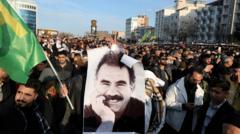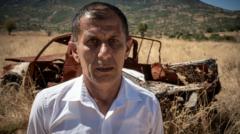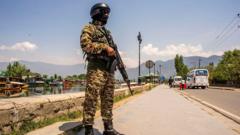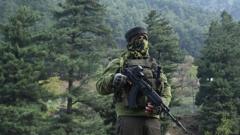The PKK's decision to disband marks a significant turning point in Turkish-Kurdish relations, and presents both challenges and opportunities for future negotiations.
Historic Move: PKK Announces Disbandment and Laying Down of Arms

Historic Move: PKK Announces Disbandment and Laying Down of Arms
Outlawed Kurdish group PKK ends 40-year insurgency in a bid for peace and greater rights.
The Kurdish militant group PKK, which has engaged in a decades-long insurgency against the Turkish government, has officially declared its intent to lay down arms and disband. This significant announcement follows a recent call from Abdullah Ocalan, the group's imprisoned leader, who advocated for disbandment in a letter penned from his solitary confinement on an island prison since 1999.
Initially established to advocate for an independent Kurdish homeland, the PKK's goals have shifted over the years. Now, the organization is focused on seeking greater autonomy and rights for Kurdish people, who make up approximately 20% of Turkey's population. The devastating conflict has resulted in the deaths of over 40,000 individuals.
Ocalan's February letter stressed the importance of democracy, asserting that "there is no alternative to democracy in the pursuit and realization of a political system." Although the future remains uncertain, there are discussions surrounding potential concessions, including the possibility of Ocalan’s release from prison, as Kurdish leaders press for a dialogue that may lead to enhanced rights.
The PKK's decision can be attributed to various factors, including significant military losses against Turkish forces and changing dynamics across the region that have restricted their operations in neighboring Iraq and Syria. Moreover, President Erdogan's political aspirations for the next presidential election in 2028 necessitate support from pro-Kurdish parties.
In response to the disbandment, a spokesperson for Erdogan’s ruling AK Party suggested that this move is a crucial step towards achieving a "terror-free Turkey." However, experts such as Winthrop Rodgers from Chatham House caution that substantial democratic reforms are required for meaningful inclusion of Kurdish political demands. While recent gestures of goodwill from Turkish leaders have facilitated this development, the comprehensive changes needed for genuine Kurdish representation in Turkish society remain uncertain.
This development is a crucial moment in the ongoing saga of Turkish-Kurdish relations and could redefine the landscape of future engagement and rights for Kurdish citizens in Turkey.



















